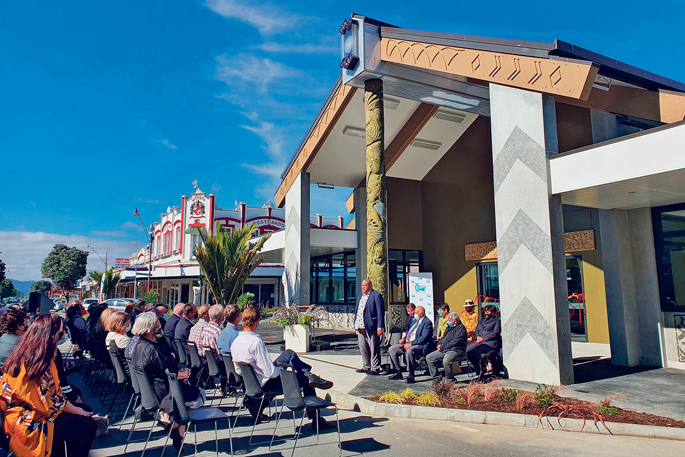Proposed cuts to library services have sparked an outcry among residents of Ōpōtiki, who say it's a place of refuge and learning for the eastern Bay of Plenty community.
Ōpōtiki District Council is looking at reducing services at Te Tāhuhu o Te Rangi, the district’s $4 million library and digital hub, to mitigate rates increases.
Some residents say projects such as new jetties and boat ramps for the town wharf area should be put on hold instead.
The council has already trimmed back its rates rise from 34 percent to 13 percent and is considering cuts to services that could get the figure as low as 10.5 percent. These include cuts to levels of service at library, iSite, event funding and parks and reserves. At a meeting earlier this month the mayor and councillors endorsed these directions for the drafting of the upcoming Long-term Plan 2024-34.
However, Mayor David Moore said the move to cut services was not a done deal.
“The guidance we have given the chief executive has been to help create a draft that we will then consult on. Public feedback is an important part of the process.”
Former Ōpōtiki Library staff member Dido Eden spoke out against cutting library services.
Te Tāhuhu o Te Rangi was “an amazing facility”, especially for those least resourced in the community, Eden said.
“[It is] a refuge, a place of learning, of peace, of play, of community.
“If our library goes then we are on a slippery slope. It is not about books it is about people.”
Ōpōtiki-based television and filmmaker Kim Webby, a frequent user of the library, said the council had a hard job ahead finding places to make cuts, but they needed to “look away” from Te Tāhuhu o Te Rangi.
Currently working on an Anzac programme for Whakaata Māori, she has made use of the library's books on the World War I Pioneer Battalion and the World War II Māori Battalion.
“It’s a really good research resource for me. As well as that, because I work at home, sometimes it’s just nice to have somewhere to go and work where there’s other people around.
"Out of that, we’ve organised a group of women who all work from home that get together for lunch once a month. It’s a really great initiative that’s just grown organically out of the library."
The library was also used by children after school, who don’t necessarily have access to digital devices, she said.
"They’re in there doing their homework. It’s a safe place for them to be.
“Older people like my mum use it a lot for help with the computer."
Digital media and documentary creator Ivor Jones, who council commissioned to create a documentary about the artists who work is showcased in Te Tāhuhu o Te Rangi, said it would be “a disaster” if services were cut.
He referred to a recent council decision to allocate up to $190,000 for resource consent applications for improvements to the wharf area for recreational wharf users and mussel boats.
“The council needs to prioritise the needs of the people of the district over business interests. They should not be paying $190,000 to build boat ramps and jetties,” he said.
Former mayor Lyn Riesterer also disagreed with the direction the council is taking.
“They’re reducing the most well-used resources and activities in the district,” she said.
“The best option for rates management is delaying operational projects."
Riesterer said the council is focused on putting in boat ramps down at the wharf, but it doesn't need to be done for another year or so.
“They’re trying to support [the mussel industry] but it shouldn’t be at a cost to the ratepayers.”
Ms Riesterer said plans to cut council-organised events in the district was also “short sighted”.
“Council only budgets $40,000 a year (for events) and all the rest of the cost of the amazing events we have had in Ōpōtiki were externally funded. Our programme of events brings people to Ōpōtiki."
 Ōpōtiki Mayor David Moore says the move to cut services is by no means a done deal.
Ōpōtiki Mayor David Moore says the move to cut services is by no means a done deal.
Mr Moore said the council had very few places to cut costs, but were open to suggestions.
“We believe these areas have the least impact on our community in the long term,” he said.
“In regard to spending on a boat ramp and jetties, none of us want to see mussel boats continuing to ship to Whakatāne once we have an operational harbour later this year. So, of course, we need to get the wharf up and running ... while we wait for the marina to come online.
"We already have funding set aside for that including external funding from central government.”
While consultation on the long-term plan has been deferred until later this year, the public are able to engage with the council on the subject through its online portal, “Hono Mai”, at connect.odc.govt.nz/long-term-plan-2024-2034.
LDR is local body journalism co-funded by RNZ and NZ On Air.




2 comments
The Master
Posted on 03-03-2024 12:37 | By Ian Stevenson
It is a small community, so limited hours makes a lot of sense, people just need to be realistic.
Alternative, those who want to retain the library services as now should put their hand up and have a targeted rate applied to them only.
Target?
Posted on 04-03-2024 08:28 | By Rebel
Targeted rates? Fine idea - I have never liked cars so happy not to pay anything for roads and as for sewerage? I'll be fine without that.The gutters on the side of the road look perfectly adequate. Really why pay rates at all?
Leave a Comment
You must be logged in to make a comment.